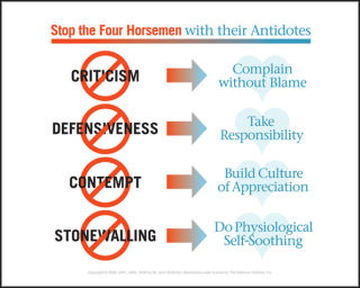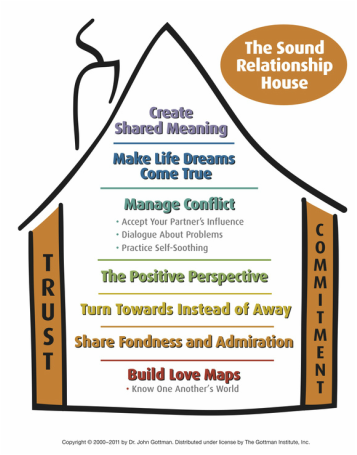Gottman Method Marriage & Couples Counseling in Austin
|
I work with High Conflict Couples. That's the dry, official term for my specialty-- honestly, I prefer to think of the couples I help as "spirited" and "passionate." Lively. Vivacious. Whipsmart. Always up for a hearty debate.
But there's also the shadow side: volatile, disregulated, in pain, misunderstood. You love each other. You really, really do. When things are going well, you marvel at your luck. The origin story of your relationship is romantic or serendipitous, you have a wealth of happy memories together, and you are committed to working through your issues. These days, though, things are getting a little out of control. Small fights increasingly go nuclear. It feels like you can't do or say anything right. You've both said and done things you regret. The negativity in your relationship is sometimes overwhelming. During conflict, it feels like your loving partner is temporarily replaced by an enemy. |
How can Gottman Method Therapy help?
We don't have to guess about what makes love work for the long haul: we can, instead, use decades of the Gottman Institute's clinical knowledge as an effective, research-validated tool to help build healthy, loving relationships that last.
In a nutshell: relationship "masters" naturally have habits and behaviors that we can learn and practice. Relationship "disasters" naturally have certain habits and behaviors that we can work to avoid. You'll learn how to do more of the good, less of the bad. (It's simple! But not at all easy.)
The Gottman Method approach is directive, experiential, and incredibly practical. Think of me as a coach, a plumber, or as a mechanic for your relationship -- in my office, you'll be solving problems, learning new things, and practicing more effective ways to communicate.
In a nutshell: relationship "masters" naturally have habits and behaviors that we can learn and practice. Relationship "disasters" naturally have certain habits and behaviors that we can work to avoid. You'll learn how to do more of the good, less of the bad. (It's simple! But not at all easy.)
The Gottman Method approach is directive, experiential, and incredibly practical. Think of me as a coach, a plumber, or as a mechanic for your relationship -- in my office, you'll be solving problems, learning new things, and practicing more effective ways to communicate.
How's Gottman different from regular couples therapy?
Well, in addition to being goal-oriented and built upon decades of solid research, we'll start off with a detailed, structured intake process that includes both discussions in my office as well as a comprehensive online assessment you complete at home. By our third session, we will have an incredibly in-depth understanding of the hidden dynamics of your relationship and a specific, targeted, customized treatment plan. Though the Assessment seems like a big investment of time (and you may be quite eager to skip assessment and launch right into treatment), doing the full Gottman Assessment at the beginning of therapy ends up saving you time and money in the long run. Achieving this level of understanding and clarity about what's happening in your relationship can take months with less structured approaches.
A little secret: conflict isn't always a bad thing!

Conflict can be an integral part of a fiery, interesting, engaging relationship. Contrary to popular belief, conflict -- even a whole lot of conflict! -- isn't always unhealthy or negative. It isn't even necessarily a predictor of unhappiness or breakups.
Here's the thing: conflict itself totally isn't the issue. It's all in how you DO your conflict. Are you repairing well? Are you able to listen to one another? Or are you escalating, getting out of hand, letting hurts build up, walking on eggshells, or fantasizing about leaving just to escape the negativity?
Right. So that's where I come in.
Here's the thing: conflict itself totally isn't the issue. It's all in how you DO your conflict. Are you repairing well? Are you able to listen to one another? Or are you escalating, getting out of hand, letting hurts build up, walking on eggshells, or fantasizing about leaving just to escape the negativity?
Right. So that's where I come in.


